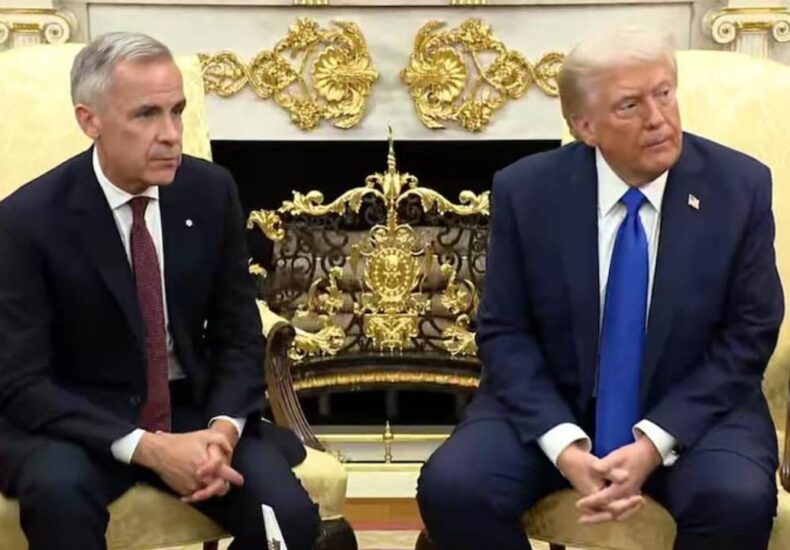
Trump Raises Tariffs on Canada by 10% After Anti Tariff Ad Sparks Tension
Fundacion Rapala – In another sharp turn in U.S. Canada trade relations, President Donald Trump announced a 10% tariff increase on Canadian goods, escalating tensions after a controversial anti tariff advertisement aired by the Ontario government. The statement, posted on Trump’s Truth Social account on Saturday (Oct. 25, 2025), accused Canada of “misrepresentation” and “hostility.” The move came only days after the ad aired during Game 1 of the World Series, a high visibility event watched by millions. The ad quoted Ronald Reagan’s famous 1987 line, “Trade barriers hurt every American worker,” a message that Trump perceived as a direct challenge to his protectionist trade stance. For one of the world’s largest and most intertwined economic partnerships, this step signals rising uncertainty amid an already fragile global trade environment.
Inside the Controversial Ontario Advertisement
The ad, sponsored by the Ontario provincial government, used archival footage of former U.S. president Ronald Reagan speaking in defense of free trade. While intended to promote open markets and economic cooperation, the timing and tone appeared to criticize Trump’s ongoing tariff policies. The 30 second spot aired prominently on U.S. television, including during the World Series broadcast between the Toronto Blue Jays and Los Angeles Dodgers. Trump’s reaction was immediate and furious. On social media, he labeled the commercial a “fraud”, alleging it was designed to sway the U.S. Supreme Court and undermine his trade agenda. Ontario’s Premier Doug Ford, facing backlash from Washington, later announced that the ad campaign would be suspended starting Monday. Despite Ford’s attempt to defuse tensions, the diplomatic damage had already been done.
Trump’s Retaliatory Tariff: A Familiar Strategy
For Trump, tariffs have long been both an economic weapon and a political statement. His decision to raise duties by 10% “over and above” existing rates echoes the aggressive trade measures of his first term. In August 2025, his administration already imposed 35% tariffs on Canadian goods not covered by the U.S. Mexico Canada Agreement (USMCA), alongside a 50% duty on steel and aluminum imports worldwide. This latest increase, however, appears less about economics and more about symbolism. By responding to a political advertisement with a trade penalty, Trump reinforces his image as a defender of American industry even at the expense of diplomatic goodwill. Yet such moves often have mixed results: they may rally domestic supporters while unsettling markets and business leaders on both sides of the border.
Economic Impact: Small Shock, Big Signal
From an economic standpoint, the new tariffs may have limited short term impact but significant long term implications. According to data from the Office of the U.S. Trade Representative, over 75% of Canadian exports to the U.S. are already exempt from tariffs under the USMCA framework. Still, the announcement injects uncertainty into supply chains that depend heavily on cross border trade. Canada remains America’s second largest trading partner, with goods and services worth over $900 billion annually. Economists warn that renewed friction could disrupt auto manufacturing, agricultural exports, and technology components that flow freely between the two economies. As one trade analyst put it, “Even symbolic tariffs create real anxiety in boardrooms. Companies delay decisions when policy feels unpredictable.” In that sense, Trump’s move could chill investor confidence more than it changes price tags.
“Read More : Trump Urges Israel to Stop Gaza Bombing, Says Hamas Ready for Peace”
Canadian Response: Caution, Diplomacy, and Disappointment
The Canadian government responded cautiously, choosing diplomacy over confrontation. Prime Minister Mark Carney held talks with Ontario’s premier, urging restraint and a return to dialogue. Carney emphasized that Canada remains committed to free and fair trade, describing Trump’s retaliation as “regrettable but not irreversible.” Business groups also weighed in. Candace Laing, president of the Canadian Chamber of Commerce, warned that “tariffs at any level remain a tax on America first, then on North American competitiveness as a whole.” Her statement underscores a shared concern among economists: that protectionist policies weaken rather than strengthen regional growth. Privately, Canadian officials expressed frustration that a provincial ad meant for domestic audiences had triggered such a broad based U.S. response. Still, they refrained from escalating the rhetoric, leaving the door open for renewed trade discussions.
The Reagan Factor and Legal Tensions
Adding another twist, the Ronald Reagan Presidential Foundation & Institute criticized Ontario’s use of Reagan’s archival footage. In a post on X (formerly Twitter), the foundation stated that it “did not grant permission” for the clips and accused the ad of “selective editing” that misrepresented Reagan’s message. The foundation also announced it was reviewing legal options. Trump quickly cited this in his social media post, portraying the ad as deceitful. The controversy highlights how Reagan’s legacy long a symbol of free trade conservatism has become a political fault line within modern Republican politics. For Trump, invoking Reagan’s name to defend tariffs may seem ironic, yet it reinforces his populist message: that global trade must serve American interests first. The dispute also raises questions about the ethics of using historical imagery in modern political communication.
A Deepening Divide in North American Trade Relations
Trump’s tariff escalation underscores a deeper philosophical divide between Washington and Ottawa. While Canada champions open markets and multilateralism, Trump’s White House favors economic nationalism and bilateral leverage. The two approaches have clashed repeatedly since 2018, from dairy imports to automotive parts. Although the USMCA was meant to stabilize trade relations, repeated tariff flare ups show that trust remains fragile. Analysts suggest that this latest move could further complicate North American supply chains, already strained by global inflation and post pandemic adjustments. For American voters, Trump’s tough stance may play well politically. For Canadian exporters, it signals another unpredictable chapter in cross border commerce. The broader risk is that both sides lose sight of what the Reagan era once stood for mutual growth through cooperation rather than confrontation.